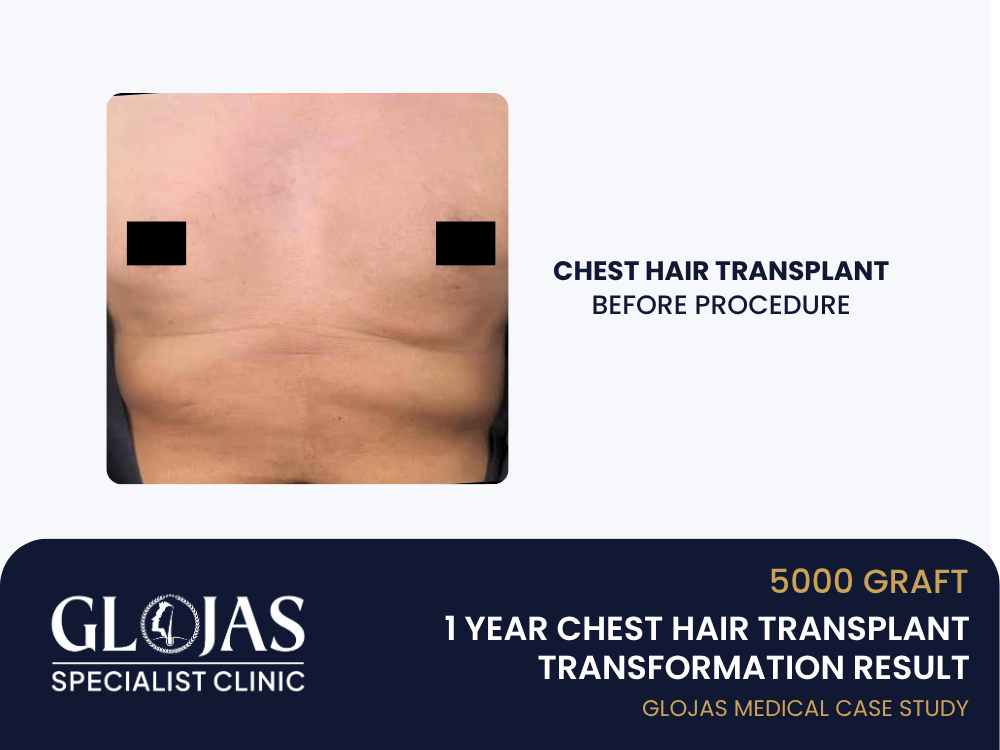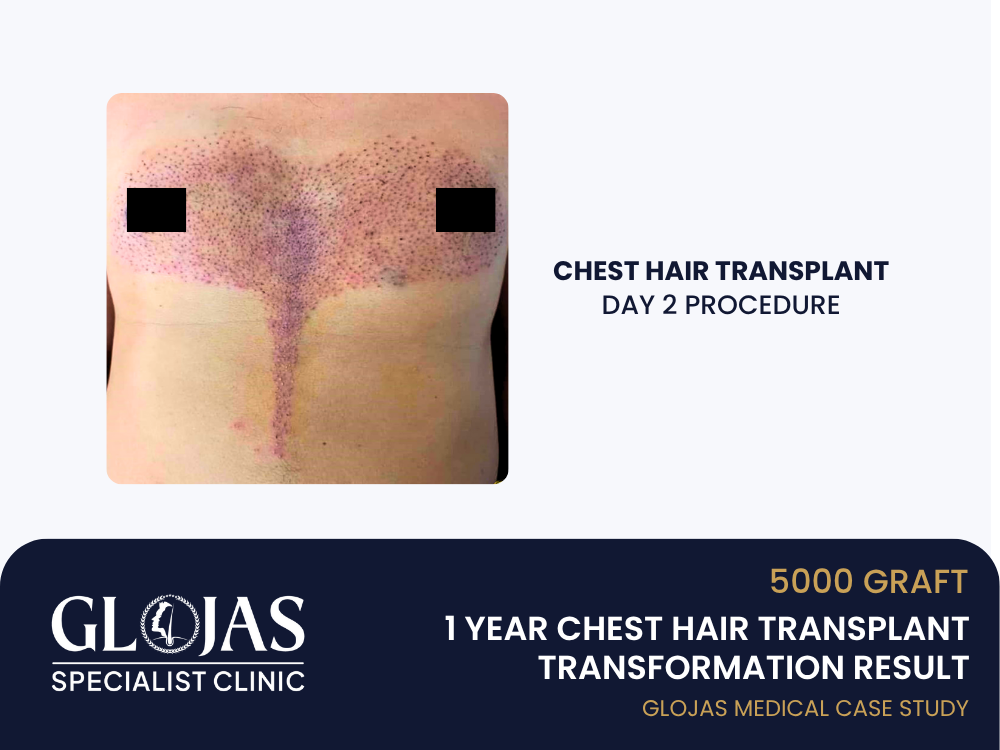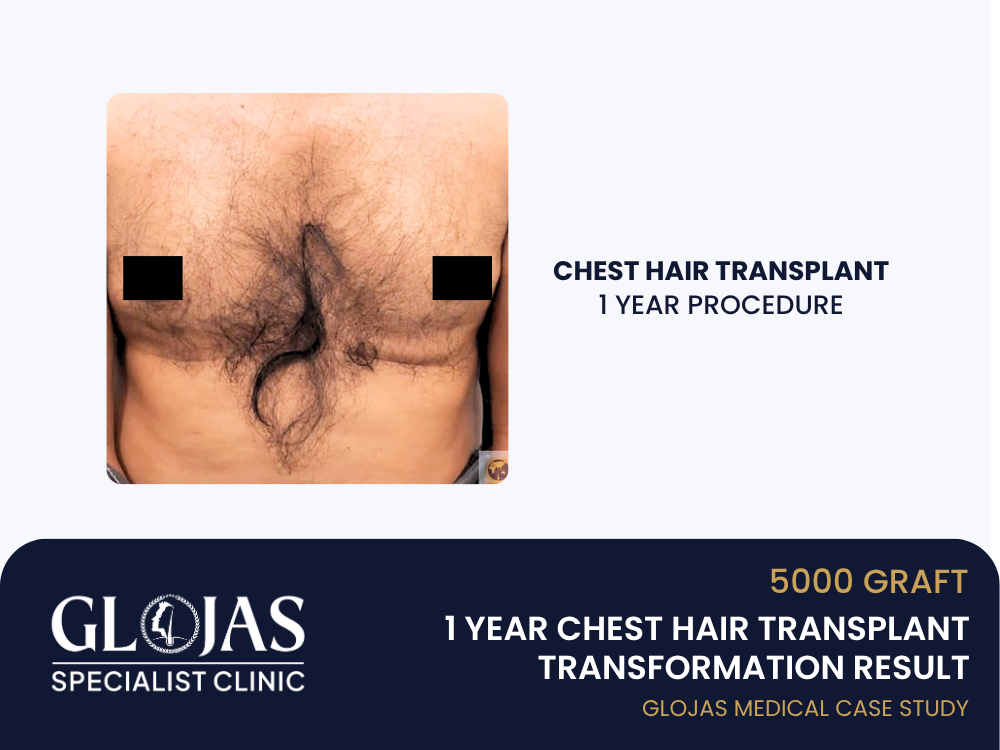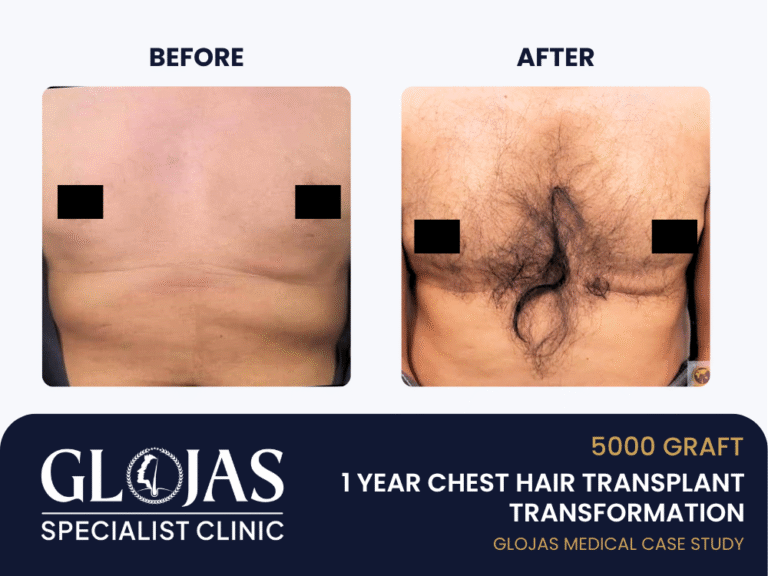For many men, chest hair represents masculinity, confidence, and sexual maturity. But not all are genetically gifted with thick or evenly distributed hair in this area. Whether due to genetics, previous shaving, scarring, or hormonal factors, sparse chest hair can affect self-image, especially in cultures or lifestyles where body hair is associated with a strong masculine identity.
In this case study, we explore how a SMART™ FUE Chest Hair Transplant using 5,000 grafts helped a 34-year-old male patient achieve a natural, fuller chest appearance. At the 1-year mark, the results are impressive, showcasing thick, uniform coverage and high patient satisfaction.
Patient Profile
Age: 34
Concern: Bare chest, minimal to no natural chest hair
Goal: Masculine, even chest hair coverage
Donor Area: Scalp (occipital and parietal zones)
Medical History: No hormonal or dermatological conditions; nonsmoker
Motivation: Social confidence, aesthetics, and personal image
Why Chest Hair Transplant?
Just like scalp or beard transplants, chest hair transplant offers a permanent solution for men who want to enhance their body hair for personal or aesthetic reasons. It can:
Restore hair in bare areas
Add volume and uniformity
Help conceal scars
Create a natural, masculine chest pattern
In this case, the patient had very light body hair and wanted to redefine his chest to better reflect his ideal physique.
Why SMART™ FUE Technique?
SMART™ FUE (Scalp Micro Advanced Restoration Technique) is a next-generation approach to hair transplantation that’s highly suited for areas like the chest, where precision and angle control are vital.
Benefits include:
Minimal scarring with micro punches (0.6–0.8 mm)
Accurate graft placement at natural angles
High survival rate of grafts due to enhanced hydration and handling
Natural results even on curved or uneven skin surfaces
Consultation & Planning – Cheat Hair Transplant
The patient desired a V-shaped hair pattern starting from the center of the chest, expanding outward to the pectoral region, and lightly fading toward the upper abdomen. He wanted a “natural but dense” look, similar to what one might see in fitness models or Mediterranean body types.
Key Evaluations:
Strong donor supply from the scalp with coarse hair texture
Skin elasticity and color are ideal for chest graft survival
No history of keloids, which is critical for body transplants
Graft Plan:
Total Grafts: 5,000
Distribution: Central sternum (1,500), left & right pectorals (2,000), fading edges (1,500)
Graft Type: Mostly doubles and triples for bulk, singles for outline and feathering
Procedure Overview

Technique Used: SMART™ FUE
Duration: 2 days (split session: 2,500 grafts per day)
Anesthesia: Local
Tools: Micro-punch extraction, implanter,s pens
Downtime: 3–5 days of rest recommended
Procedure Steps:
Donor area shaved and cleaned
Grafts harvested using micro punches
Sorted by hair count (1s, 2s, 3s)
Chest mapped and implanted following chest muscle contours
Recovery kit and post-op care plan provided
Recovery Timeline

| Timeframe | Recovery & Results |
|---|---|
| Day 1–3 | Redness and mild swelling on the chest |
| Week 1 | Crusting/scabbing around follicles (not to be scratched) |
| Week 3–4 | Shedding phase (temporary loss of implanted hairs) |
| Month 2–3 | New hairs begin emerging, thin and soft |
| Month 6 | 60–70% density visible, significant transformation |
| Month 12 | Full result achieved: thick, even coverage with natural pattern |
The patient began light workouts after 2 weeks and reported no issues with infection or irritation.
1-Year Results

The transformation after 12 months was significant:
| Before | After 1 Year |
|---|---|
| Flat, hairless chest | Dense chest hair with V-shape growth pattern |
| No definition in the pectoral area | Fuller chest with enhanced masculine contours |
| Embarrassed to go shirtless | Confident, now frequently goes to the beach and gym |
Patient Testimonial
“This gave me the confidence I never had in my 20s. I always felt self-conscious being shirtless. Now, I finally look the way I’ve always wanted — masculine, natural, and complete.”
Post-Op Care Routine
No chest shaving for 4–6 weeks
Gentle moisturizing daily
Avoid the gym/sweating for 1 week post-op
No sun exposure for 1 month
Wear breathable fabrics to prevent irritation
Optional PRP boosters at months 3 and 6
5 Frequently Asked Questions (FAQ)
1. Is chest hair transplant permanent?
Yes. The transplanted follicles are taken from areas of the scalp that are genetically resistant to hair loss, and they grow permanently on the chest.
2. Will it look natural?
With SMART™ FUE, each graft is placed according to the natural angle and curvature of the chest, ensuring realistic, undetectable results.
3. Can I shave or trim my chest hair after the procedure?
Absolutely. You may begin trimming after 6 weeks, and shave with care once full healing is complete (usually around 3 months).
4. Will the hair feel like natural chest hair?
Initially, the transplanted scalp hair may feel slightly different, but it gradually blends in and becomes softer over time, often indistinguishable from natural chest hair.
5. Are there any risks or side effects?
Like any FUE procedure, risks are minimal when done properly. Mild swelling, redness, or folliculitis may occur in the short term but are easily managed.
🧾 Final Thoughts
A SMART™ FUE Chest Hair Transplant is a powerful and underappreciated procedure that can dramatically improve one’s body image and confidence. For men seeking to complete their masculine appearance with natural chest hair, this method provides reliable, long-term results without invasive surgery.
With 5,000 grafts, our patient went from completely bare to full chest coverage in just 12 months — a transformation that speaks for itself.
